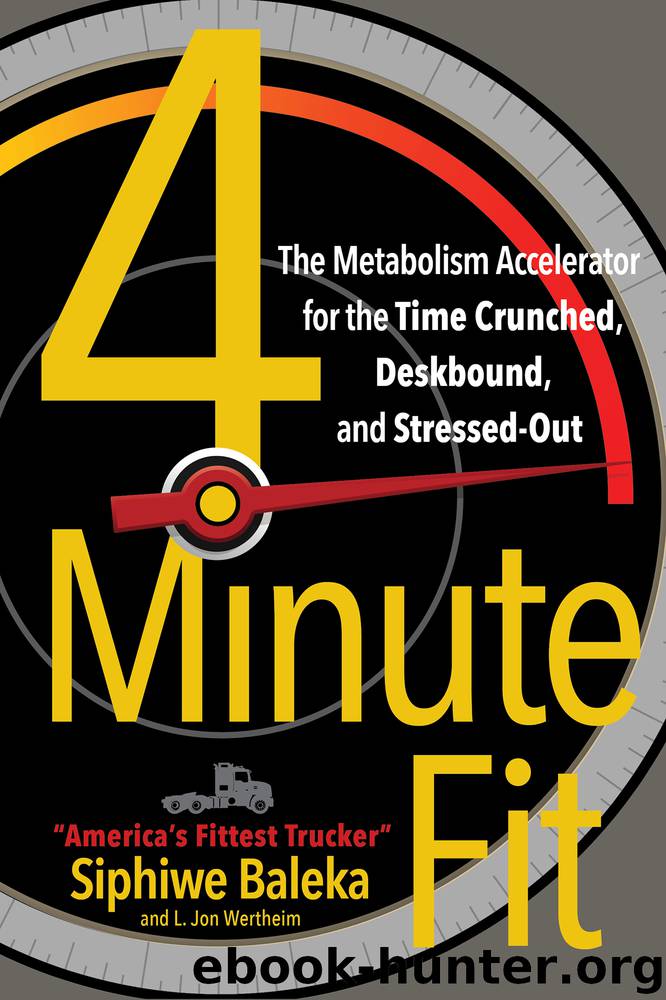4-Minute Fit by Siphiwe Baleka & Jon Wertheim

Author:Siphiwe Baleka & Jon Wertheim
Language: eng
Format: epub
Publisher: Touchstone
Swap In Protein
Carbs undermine your metabolic function, because they’re digested quickly and they’re packed with energy—energy your body is forced to store as fat. Protein, on the other hand, is a key driver of metabolism. Protein helps fire up your fat burners in two ways. First, it’s the building block of muscle, and the more muscle you have, the greater your metabolism. Muscle burns energy on a regular basis, so it steals energy away from fat cells—specifically belly fat cells—in order to sustain itself. Your belly fat just hates the idea of your muscles storing energy (in the form of glycogen) that could otherwise be used to make more fat cells. (You’ll read more about why building muscle is so important a little later in this chapter.)
Second, the very act of eating protein actually burns calories. About 25 percent of the calories you eat in the form of protein are burned up just digesting the protein itself (carbs and fat burn up no more than 10 to 15 percent of their calories). A 2012 study in the International Journal of Obesity found that obese adults who ate three servings of protein-packed yogurt each day as part of a reduced-calorie diet lost 22 percent more weight and 61 percent more body fat compared to those who didn’t have the yogurt.
Protein also keeps you fuller longer—in part because that intense digestive process means your body perceives you as being satiated. In a 2013 study in the journal Appetite, women were fed low-, medium-, or high-protein afternoon snacks. Those who ate the most protein had the lowest levels of hunger and waited longer before they chose to eat again than those who ate lower-protein snacks. In part, that’s because of our hormonal response to protein. Another study published in the American Journal of Clinical Nutrition found that a high-protein meal, as opposed to one high in carbs, increases satiety by suppressing the hunger-stimulating hormone ghrelin.
And switching to a higher-protein diet helps you build a base that will keep you burning calories for life. In a study in the International Journal of Obesity, researchers found that dieters who ate a low-calorie, high-protein diet for eight weeks lost an average of 24 pounds. But unlike those in the trial who ate a low-protein, low-calorie diet, those in the high-protein group continued to lose weight, an average of 5 percent more, after the study was over. And after six months, the high-protein group had kept all of their weight off.
Download
This site does not store any files on its server. We only index and link to content provided by other sites. Please contact the content providers to delete copyright contents if any and email us, we'll remove relevant links or contents immediately.
How to Be a Bawse: A Guide to Conquering Life by Lilly Singh(7464)
Deep Work by Cal Newport(7058)
The Longevity Diet by Valter Longo(5057)
The Fat Loss Plan by Joe Wicks(4903)
The Four-Pack Revolution by Chael Sonnen & Ryan Parsons(3965)
The Ultimate Bodybuilding Cookbook by Kendall Lou Schmidt(3927)
The French Women Don't Get Fat Cookbook by Mireille Guiliano(3650)
Not a Diet Book by James Smith(3409)
Super Food Family Classics by Jamie Oliver(3398)
Factfulness_Ten Reasons We're Wrong About the World_and Why Things Are Better Than You Think by Hans Rosling(3230)
Turn Up Your Fat Burn! by Alyssa Shaffer(3212)
Self-Esteem by Matthew McKay & Patrick Fanning(3132)
Tom Kerridge's Dopamine Diet: My low-carb, stay-happy way to lose weight by Kerridge Tom(3094)
Body Love by Kelly LeVeque(3053)
The Unbecoming of Mara Dyer by Michelle Hodkin(3030)
The Fat Chance Cookbook by Robert H. Lustig(2831)
Tone Your Tummy Type by Denise Austin(2831)
LL Cool J's Platinum 360 Diet and Lifestyle by LL Cool J(2725)
Men's Health Best by Men's Health Magazine(2587)
